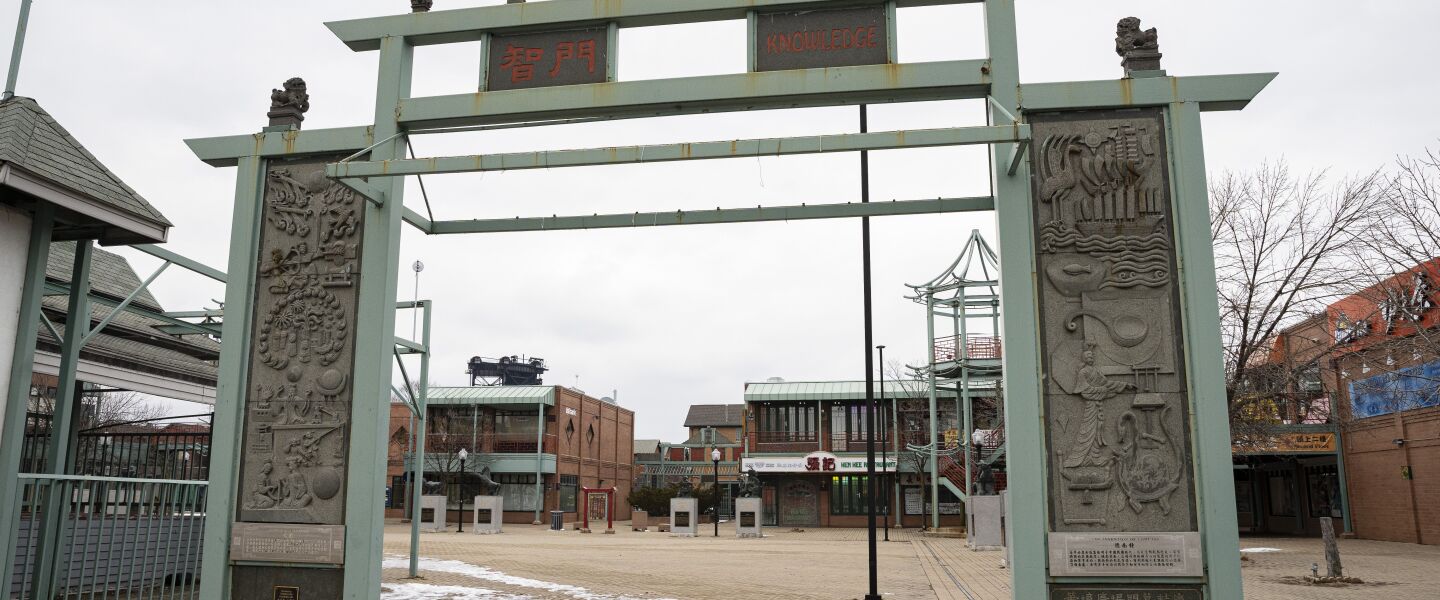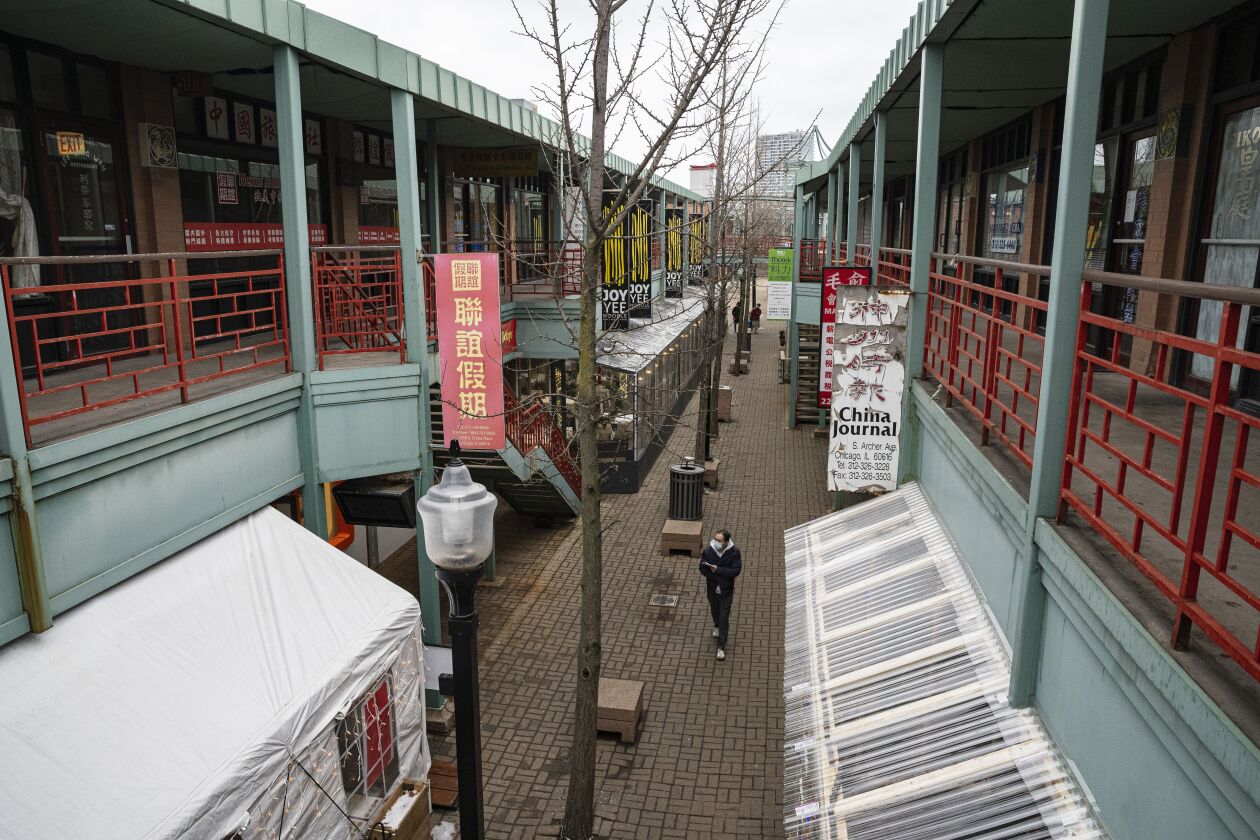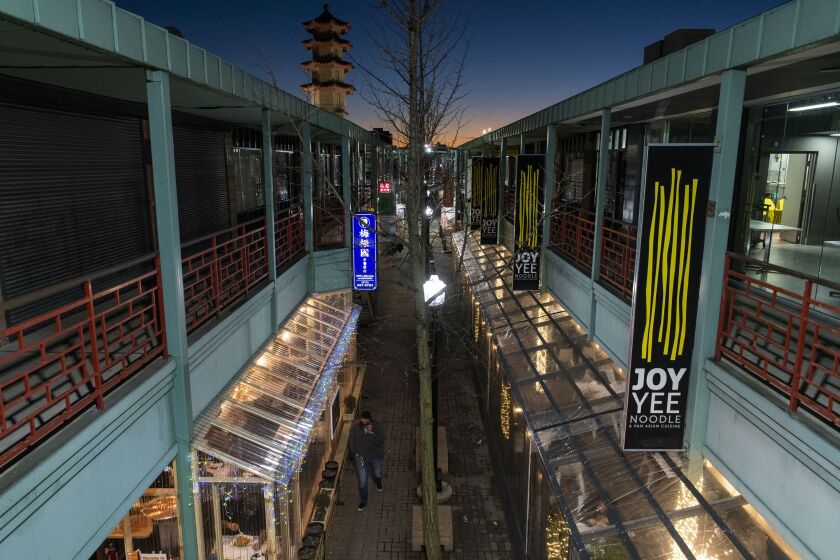The owners of a mall called Chinatown Square had, over eight years, failed to pay more than $1 million in property taxes and interest for the mall’s sweeping plaza and brick-paved corridors along Archer Avenue in the heart of booming Chinatown.
They say they had no idea that they owed any taxes until 2017. That’s when an obscure Cook County government agency filed a claim at the county treasurer’s scavenger tax sale to eventually acquire the mall’s 62,000 square feet of common areas, which are separate from its stores and restaurants.
The Cook County Land Bank Authority’s original plan was to wipe out the years of unpaid taxes and find a new owner.
Chinatown was an unlikely neighborhood for the land bank to step in. The agency was created to help get vacant, blighted and tax-delinquent properties in downtrodden neighborhoods back in use, paying taxes. But the plaza and the corridors connecting them through the two-story mall weren’t abandoned. And Chinatown was hardly blighted.
Yet in stepped the land bank.
It ended up backing away from its original plan. Instead, it made an unusual deal with the Chinatown Square Association, 2133 S. China Pl., which oversees those common areas, that would have erased more than $620,000 of the unpaid property taxes it owed, covering 2010 through 2015.
What made the deal even stranger: The county agency would then sell the property back to the association — the same group that hadn’t paid its taxes for eight years. And it would do that for a paltry $3,500 — just enough to cover the costs of doing the deal.
The association wouldn’t entirely get out from under its unpaid tax debt. It still would owe $286,000 in back taxes plus thousands of dollars in interest for 2016 and 2017 — those years weren’t part of the tax sale.
It wasn’t until a year and a half after the tax sale that the land bank’s lawyer put the kibosh on the deal. He pointed out that the agency didn’t have the legal right to sell the tax-delinquent property back to the same owner that had failed to pay the taxes in the first place. He terminated the sales contracts. And the unpaid taxes and interest kept piling up.
Undeterred, the Chinatown Square Association and its president Sum Chu Ma went looking for another way out of their big tax burden. They asked then-Cook County Assessor Joseph Berrios to cut the tax bills by lowering the value he put on the property. But Berrios wouldn’t go along. Appeals to the Cook County Board of Review — another avenue to try to get the official value placed on a property cut so the owner doesn’t have to pay as much in property taxes — also got rejected.
But Chinatown Square’s owners kept trying, and eventually they got some relief. In December, they got Berrios’ successor Fritz Kaegi to agree to lower his estimation of the value of the property by 60% for the period covering 2016 to 2019. That saved them $380,000 in taxes.
They’ve paid $182,700 in taxes and interest owed for 2018 and 2019. But they still owe a total of $784,000 for taxes for the previous years, going back to 2010, plus interest.
Why did the new assessor give them the tax break his predecessor wouldn’t? Kaegi spokesman Scott Smith says the Chinatown Square Association provided evidence that the common areas are worth substantially less than the value that had been placed on the property by both Berrios and Kaegi.
Before, Smith says, “They didn’t make a good case before, as I understand it.”
This time, though, “They had different representation, who were much more rigorous in their appraisal,” he says.
And just how did the land bank authority decide in the first place to take the unusual steps of doing a deal in a booming neighborhood like Chinatown and then deciding to hand back a property that was tax-delinquent for years to the same owner that hadn’t paid the taxes?
Asked about the deal, Tarrah Cooper Wright, a private contractor hired to speak on behalf of the county agency, sidesteps the question, responding that this “was one of thousands [of properties] bid upon at the 2017 scavenger sale with no prior discussion of it.”
But everything worked out in the end, according to Cooper Wright: “When the contract was completed, our attorney . . . began due diligence and determined that the proposed purchaser was not eligible to purchase. The transaction was canceled permanently, ending the land bank’s involvement with that property now and in the future.”
Since the land bank, which was created under the leadership of Cook County Commissioner Bridget Gainer with the support of Cook County Board President Toni Preckwinkle, first began acquiring and selling properties in 2014, it’s been involved in a number of questionable dealings, the Chicago Sun-Times previously has reported.
In a series of stories since November 2019, the Sun-Times has reported that the land bank:
• Sold two West Side lots to a convicted drug dealer while he was under federal indictment.
• Sold a suburban home to a land bank employee — the assistant to Robert Rose, the agency’s executive director — despite having higher bids from other would-be buyers.
• Agreed to take ownership of a two-story building owned by Chester Wilson, chief of staff to Ald. Carrie Austin (34th), then wiped out more than $200,000 in back property taxes and interest — and sold the property for $40,000 to Wilson’s former business partner.
Lawyers and other representatives of the Chinatown Square Association won’t discuss their tax problems, which, according to documents and emails on file with the land bank and the assessor’s office, they blame on a snafu from the 2009 sale of a slice of mall property to a developer next door. Each of the stores and restaurants in the mall gets its own tax bill.
“This was the first recorded time that the CSA’s board members were made aware of any outstanding property taxes of the common area,” attorney Paul K. Lee wrote to Kaegi. “The common area was never taxed until 2010, and, more importantly, the CSA never received a single bill.”
According to Lee, the unpaid tax bills were mailed to the wrong address and not to the association.
Once the land bank put in the claim on the property in 2017, Chinatown Square’s lawyers asked that it delay going to court to take the deed for the common areas.
Their requests morphed into the deal — spelled out in two signed agreements at the end of 2018 — that would have seen much of its delinquent taxes forgiven and allowed it to keep the property.
In October 2018, Joe Huang, another attorney for Chinatown Square, emailed Rose and his aides that Huang’s clients “are also on board with the plan for the Cook County Land Bank to acquire” the property “through tax deed with a contract in place to sell back the common-area parcel back to the Chinatown Square Association.”
A top land bank aide replied, copying Rose and the others: “We will move forward to take this tax certificate to deed. As Mr. Rose indicated, we will sell the parcel back to the Association for the cost to complete this transaction, which is $3,500….The Land Bank will then generate a term sheet and then generate a purchase and sales agreement.”
In March 2019, though, the land bank walked away from the Chinatown deal and revoked its claim on the unpaid taxes, allowing Cook County Treasurer Maria Pappas to find another buyer for the unpaid taxes at her next scavenger sale.
“CCLBA’s typical process of acquiring parcels with a tax delinquency does not contemplate returning the parcel to the original owner,” the land bank’s outside attorney Stephen Soltanzadeh wrote to Huang, explaining why the deal couldn’t go ahead.
Concerned about the property tax bills that continued to pile up, Huang tried several more times to resurrect the deal, suggesting that the land bank could transfer the plaza and hallways to a sister organization of Chinatown Square.
But that didn’t fly with the land bank’s lawyer, either, “since the new entity would be the same, or essentially the same, as the one that has the current tax liability. Again, they are still willing to consider transfer to a disinterested party, but not to a party with an interest.”








